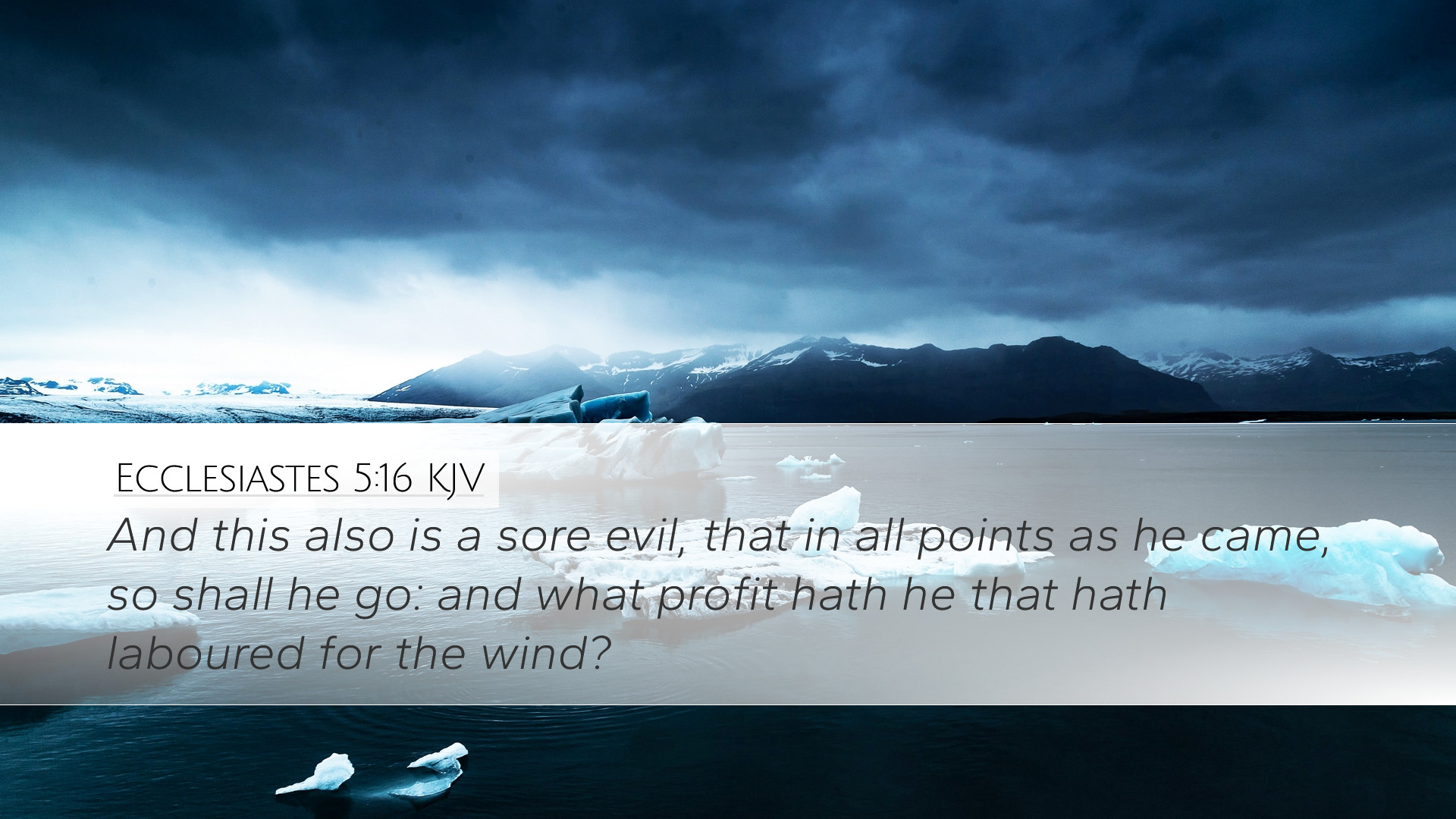Ecclesiastes 5:16 Commentary
Ecclesiastes 5:16: "And this also is a sore evil, that in all points as he came, so shall he go: and what profit hath he that hath labored for the wind?"
Introduction
The Book of Ecclesiastes offers profound reflections on the meaning and purpose of life. In this verse, the Preacher, traditionally believed to be Solomon, draws attention to the futility and poignancy of human existence and the ultimate vanity of worldly pursuits. This commentary synthesizes insights from various public domain sources to enrich understanding for pastors, students, theologians, and scholars.
The Nature of Human Existence
This verse emphasizes the temporary nature of life. As Matthew Henry notes, life is fleeting and ephemeral; every individual comes into the world with nothing and leaves the same way. The preacher asks a poignant question: what true benefit does a person gain from their labor when all such efforts ultimately yield nothing lasting?
Albert Barnes reinforces this by pointing out that the phrase "so shall he go" underlines the certainty of death, making clear that no material gain can accompany a person beyond the grave. He draws upon the inevitability of mortality to highlight the vanity of human endeavor focusing merely on earthly gain.
The Labor for the Wind
The latter part of the verse—"what profit hath he that hath labored for the wind?"—is particularly striking. Adam Clarke interprets "labor for the wind" as a metaphor for pursuing things that are insubstantial and ephemeral. Clarke eloquently states that many toil incessantly for possessions and status that, in the grand scheme of existence, are as fleeting as the wind.
This metaphor serves as a critical reflection for readers, inviting them to consider their motivations and the fruits of their labor. Is their pursuit grounded in the eternal, or are they, like many, chasing after what ultimately eludes grasp?
Contemplating Value and Worth
In examining this verse, Henry advises us to reflect on our labor and pursuits. Are they aligned with a deeper purpose or merely the fleeting whims of life? He emphasizes the importance of seeking eternal values rather than ephemeral gains, encouraging a focus on spiritual enrichment over material accumulation.
- Introspection: Henry encourages self-examination regarding life’s agenda—are we pursuing things of lasting value?
- Duration of Labor: What we regard as gains in life should consider not just immediate satisfaction but enduring significance.
Theological Insights
From a theological perspective, this verse invites contemplation of God's sovereignty over life’s events. Barnes notes that acknowledging God's role in our existence leads to recognizing that all labor not oriented towards Him may ultimately result in disappointment. Life’s fleeting nature becomes a call to higher pursuits, where eternal truths gain paramount importance.
Furthermore, the phrase highlights the discrepancy between earthly pursuits and divine purpose, prompting readers to evaluate the reward of their labor in light of eternity.
Practical Applications
For pastors and theologians, this verse serves as a critical reminder of the Christian doctrine concerning temporal vs. eternal values. It can be utilized in sermons and discussions about the futility of materialism, the value of spiritual riches, and God's overarching purpose in our lives.
- Encouraging Community Reflection: Local church groups can benefit from discussions on labor and its outcome in the light of Biblical teachings.
- Personal Application: Encourage individuals to assess their own life priorities, ensuring they are investing in pursuits with eternal significance.
Conclusion
Ecclesiastes 5:16 challenges readers to reflect on the nature of their labor and the ephemeral features of life. Through the insights of Matthew Henry, Albert Barnes, and Adam Clarke, it becomes clear that human pursuits oriented solely around material gain leave us empty-handed in the end. Instead, believers are called to labor in faith, seeking the lasting rewards of a life centered on Christ. This passage is not merely an observation of life’s vanity but an invitation to find true profit in that which endures eternally.


